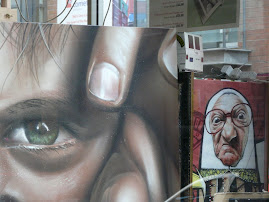During some research for an article on Parisian guerrilla artist Princess Hijab (see here and here), I stumbled across another guerrilla artists, this time from Italy, who was using the image of the hijab.
BR1 ( not sure what that stands for although strangely, in the UK it's the form that migrants have to fill in so they can work), states that his work is about normalising Muslim women by placing diverse poster-images of them on walls in the street: “My Muslim women are represented in daily life situations: they are mothers, grandmothers and daughters, smoking, taking pictures and smiling. My message is: pointing out that Muslim women have the same needs and necessities of the majority of Western women. Certainly, the only exception is the veil.”
BR1's work however has faced some serious criticisms. In his bid to draw similarities between Western and Muslim women, BR1 seems to have fallen into the patriarchal-view-of-women trap. One blogger, 'Killing denouncement', noted that BR1's images are too narrow and fit neatly into the patriarchal ideals of womanhood- i.e childcare, raising families, taking pictures and smiling. “Nevermind seeing any Muslim men (not exotic or fetishisable enough? too dangerous?), it would have been nice to see hijabis in other situations outside the traditionally feminised. Like perhaps working, or, I don’t know, holding AK-47s?”
His wide range of beautiful and bold posters also fail to, even once, represent the non-hijabed Muslim women which leads onto the issue of: is his work riding on the isn't-she-exotic-orientalism which seems to have flourished post-9/11? One comment on his flickr account made my this pop into my mind: “I love the way you're challenging the imagery of muslim women in our occidental society. Please keep up the good work!” *cringe*
I always find this issue of representing Muslim women without fetishizing them a really difficult issue to resolve. As yes, it's great to have them out there in the public sphere but it really does need to move forward from them just 'being' there to giving them the power and freedom to do stuff which is important to them. For example, in Europe there is a lot of talk of getting Muslim women involved but I don't see how the recent hijab banning spree, which seems to have hit Europe helps this.
We all know, that they only thing that this achieves, is pushing more and more Muslim women away from the public sphere back to their homes where they have the freedom to (legally) express themselves. Whilst some take off their hijabs to go to school, I always wonder how many more simply don't attend?



1 comment:
mawkish
Post a Comment